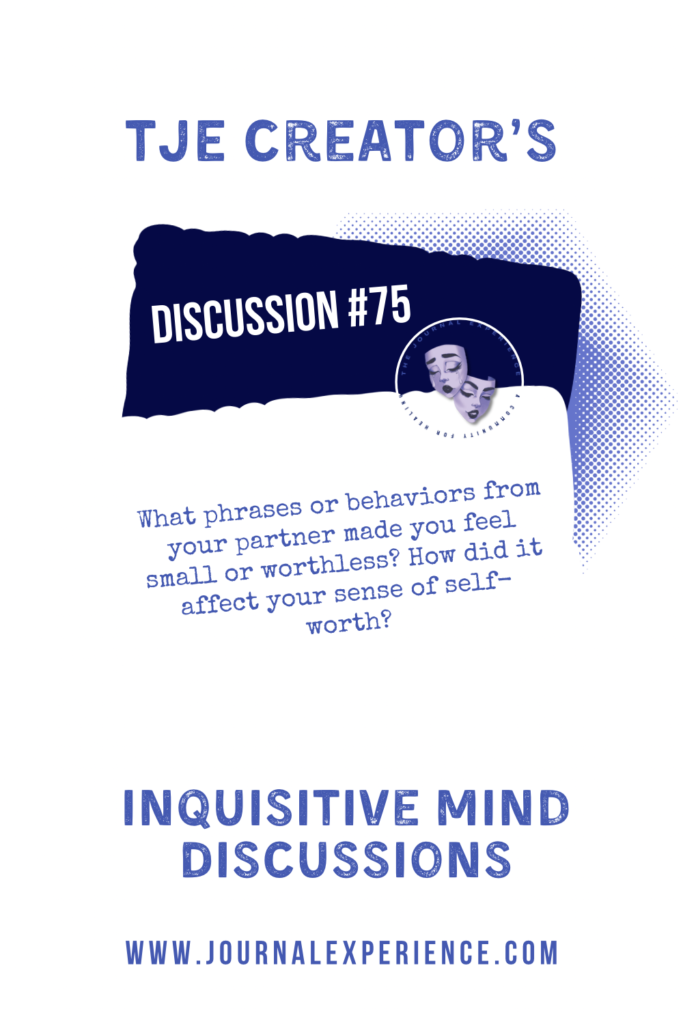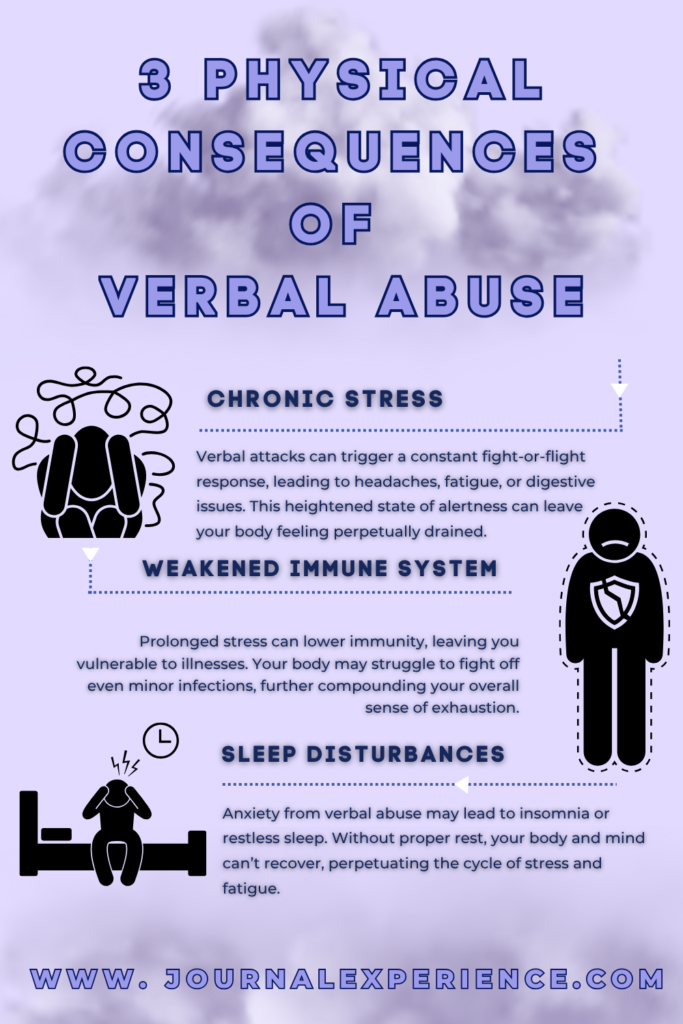If you’ve experienced verbal abuse, you already know how powerful words can be—both in harming and healing.

The effects of verbal abuse run deep, often leaving emotional and psychological scars that many struggle to understand. In this post, we’ll explore the invisible wounds verbal abuse can leave behind, help you recognize its impact, and guide you toward healing and reclaiming your voice.
Common Effects of Verbal Abuse You May Have Experienced
Verbal abuse is often dismissed or minimized because it doesn’t leave physical marks, but its effects are just as damaging, if not more so. Survivors frequently experience long-term emotional and psychological consequences that impact every aspect of their lives. Verbal abuse doesn’t just hurt in the moment; its echoes can follow you into relationships, work, and your overall sense of self. Understanding these effects can help validate your experience and provide the foundation for your healing journey.
Emotional Instability
Constant criticism, name-calling, and belittling can lead to feelings of worthlessness, self-doubt, and shame. Over time, this emotional instability can erode your ability to trust yourself and others. You may feel like you’re constantly walking on eggshells, afraid of saying or doing the “wrong” thing.
Anxiety and Depression
Survivors of verbal abuse often struggle with excessive worry, sadness, and hopelessness. The abusive words can replay in your mind, leading to a cycle of self-criticism and fear. These feelings may escalate into clinical anxiety or depression, requiring professional intervention.
Low Self-Esteem
Repeated attacks on your character can erode your confidence and self-worth over time. The more you’re told you’re “not good enough,” the more likely you are to internalize that belief. This lack of self-esteem can make it harder to pursue your goals or advocate for your needs.
Isolation
Verbal abuse can make you feel unworthy of connection, leading to withdrawal from family and friends. You might avoid social situations out of fear of judgment or ridicule, further deepening feelings of loneliness.
How Verbal Abuse Affects Your Mental and Emotional Health
The emotional wounds of verbal abuse often linger long after the words have stopped. Unlike physical scars that may heal with time, the impact of verbal abuse tends to settle deep within, reshaping your thoughts, perceptions, and overall mental well-being. It can distort how you see yourself, others, and the world around you, making it difficult to trust, connect, or even find joy in everyday experiences. Verbal abuse has a sneaky way of reshaping your identity, leading you to question your self-worth and doubt your ability to thrive. These deep and lasting effects on your mental health are why healing is such a vital part of recovery from abuse.
PTSD Symptoms

Survivors of verbal abuse may develop symptoms of Post-Traumatic Stress Disorder (PTSD), including flashbacks, hypervigilance, and nightmares. These symptoms can make it difficult to feel safe, even in environments that are completely non-threatening. Simple triggers—like a tone of voice, a specific phrase, or even a setting—can transport you back to the moments of abuse, overwhelming you with anxiety or fear. This can disrupt your ability to focus, sleep, or form new memories. Living with these symptoms often feels like walking on eggshells within your own mind, always bracing for the next emotional ambush.
Difficulty Trusting Others
Verbal abuse often erodes your ability to trust others. When you’ve been repeatedly invalidated or manipulated, it becomes second nature to question the intentions of those around you. Even the kindest gestures may feel suspicious, leaving you in a state of constant doubt. This mistrust isn’t limited to new relationships—it can seep into existing connections, creating barriers with loved ones who genuinely care about you. Over time, this inability to trust can make forming meaningful and supportive relationships feel like an impossible challenge, reinforcing feelings of loneliness and isolation.
Overthinking and Perfectionism
A common response to verbal abuse is the development of overthinking habits and perfectionist tendencies. You may feel a relentless need to avoid criticism or harsh words by being “perfect” in every aspect of your life. This coping mechanism might bring a temporary sense of control, but it often spirals into a vicious cycle of anxiety, self-doubt, and burnout. The pressure to meet unattainable standards can lead to chronic stress, as well as feelings of failure and inadequacy when perfection is inevitably out of reach. This mental battle not only drains your energy but also prevents you from celebrating your achievements, no matter how significant they may be.
Emotional Dysregulation
Prolonged exposure to verbal abuse can leave you struggling with emotional regulation. This might manifest as explosive reactions to seemingly minor triggers or, conversely, as emotional numbness where you feel disconnected from your own feelings. For some, anger or frustration may erupt in unexpected situations, creating conflict or alienating others. For others, a sense of emotional detachment may set in, making it difficult to express or even recognize what you’re feeling. These swings can make relationships and daily interactions incredibly challenging, as you navigate the unpredictable highs and lows of your emotions.
Fear of Conflict
Verbal abuse often conditions survivors to avoid conflict at all costs. You may find yourself walking on eggshells, fearing that any disagreement or assertion of your needs could result in criticism or verbal attacks. Over time, this avoidance can suppress your voice and needs, making you feel invisible in your own life. The fear of conflict might also prevent you from setting healthy boundaries, further exposing you to toxic relationships or environments.
Self-Blame and Guilt
Another insidious effect of verbal abuse is the tendency to internalize the blame. You may start believing the harmful words said to you, convincing yourself that you are the problem or that you somehow deserved the treatment you received. This self-blame can spiral into guilt, making it difficult to stand up for yourself or seek help. Over time, these feelings may become ingrained, leaving you stuck in a cycle of self-criticism that further erodes your self-worth.
Difficulty Processing Emotions
The emotional wounds left by verbal abuse can make it difficult to process and express your feelings. You might struggle to articulate what you’re going through or feel overwhelmed by the intensity of your emotions. This can result in emotional bottling, where you suppress your feelings to avoid confrontation or vulnerability. However, this suppression often leads to emotional outbursts or feelings of being completely overwhelmed when your emotions eventually resurface.
Loss of Identity
Verbal abuse can strip away your sense of self, leaving you unsure of who you are outside of the abuse. When your thoughts, feelings, and decisions are constantly undermined or criticized, it’s easy to lose touch with your own desires and beliefs. Over time, you may start to feel like a shadow of your former self, unsure of your strengths, passions, or purpose. Rebuilding your identity after such an experience takes time, patience, and intentional self-discovery.
Hopelessness and Despair
For many survivors, the cumulative effects of verbal abuse can lead to a sense of hopelessness. You may feel trapped in a cycle of negativity, unable to envision a future free from pain or self-doubt. This despair can make it difficult to take the first steps toward healing, as the path forward might feel insurmountable. However, it’s important to remember that recovery is possible, even when it feels out of reach.
Understanding these mental and emotional impacts is the first step toward breaking free from the shadow of verbal abuse. By acknowledging how deeply the abuse has affected you, you can begin to take intentional steps toward healing and reclaiming your sense of self.
If verbal abuse has left deep emotional scars, the Healing The Inner Trauma Child (HITCH) Method offers powerful tools to rebuild your inner strength, reconnect with your authentic self, and heal trauma at its core.
Physical Consequences of Verbal Abuse
Although verbal abuse primarily targets the mind, its effects often manifest in the body as well. Chronic stress from living in a verbally abusive environment can lead to significant physical health problems over time. Recognizing these symptoms can help you understand how deeply verbal abuse has impacted your overall well-being.
Chronic Stress
Verbal attacks can trigger a constant fight-or-flight response, leading to headaches, fatigue, or digestive issues. This heightened state of alertness can leave your body feeling perpetually drained.
Weakened Immune System
Prolonged stress can lower immunity, leaving you vulnerable to illnesses. Your body may struggle to fight off even minor infections, further compounding your overall sense of exhaustion.
Sleep Disturbances
Anxiety from verbal abuse may lead to insomnia or restless sleep. Without proper rest, your body and mind can’t recover, perpetuating the cycle of stress and fatigue.

Healing From the Effects of Verbal Abuse
Healing from verbal abuse is a journey that begins with small, intentional steps. It’s important to understand that recovery is not linear, but every step forward helps rebuild the sense of self the abuse tried to diminish. By taking back control of your life, you can begin to experience the peace and confidence you deserve.
Acknowledge the Abuse
Denial can keep you trapped. Accepting that verbal abuse has impacted you is empowering. This acknowledgment is not about blaming yourself but about recognizing the truth of your experience so you can move forward.
Seek Support
Talk to trusted friends, join a support group, or consult a therapist. You’re not alone in this journey. Connecting with others who understand what you’ve been through can provide validation and encouragement.
Set Boundaries
Protect your mental and emotional space by firmly limiting abusive behavior from others. Setting boundaries is a vital step in reclaiming your autonomy and ensuring your relationships are built on mutual respect.
Practice Self-Care
Prioritize activities that help you heal, such as journaling, meditation, or exercise. Self-care isn’t selfish—it’s a necessary part of rebuilding your strength and resilience.
Use Affirmations
Rebuild your self-esteem by affirming your worth and capabilities daily. Positive self-talk can help counteract the negative messages you’ve internalized from the abuse.
Healing after verbal abuse often means breaking free from cycles of emotional dependency and rebuilding self-trust. The Codependency Therapy | Self Love Recovery Treatment Program provides step-by-step guidance to help you restore emotional independence and build healthier connections.
Overview
Verbal abuse doesn’t leave visible scars, but its effects are profound, impacting mental, emotional, and physical health. Whether you’re grappling with low self-esteem, anxiety, or PTSD, healing is possible. The journey may be challenging, but each step brings you closer to reclaiming your voice and living authentically.
You don’t have to do it alone. Resources, communities, and professionals are available to support you every step of the way. By taking that first step toward healing, you’re not just surviving—you’re choosing to thrive.

True healing begins with understanding how early relational wounds shape your emotional patterns. The Webinar: Origins of Codependency and Pathological Narcissism offers crucial insight into how verbal abuse affects identity—and how to break free from its lingering hold.You deserve relationships filled with respect, support, and love—and that starts with the one you build with yourself.
Join The Journal Experience today for tools, community support, and guided resources to help you thrive. The first step to reclaiming your peace begins here. Subscribe to our newsletter and receive a free copy of the TJE Burn Book, designed to guide you through the healing process step by step. Let’s heal together.